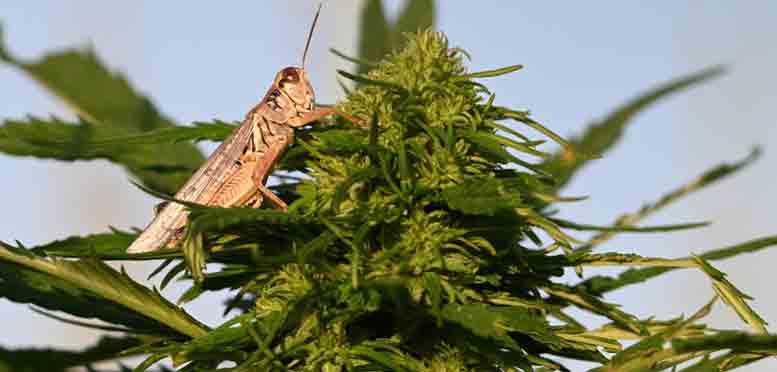While industrial hemp has a reputation for being resistant to pests, somebody forgot to tell the grasshoppers in the northwest United States, where some farmers faced a minor plague of the green bugs this past spring that’s hitting this year’s harvest.
Ben Brimlow, lead agronomist at IND HEMP, a Montana processor that works with farms comprising 9,500 acres across the U.S. northwest, said 80% of those fields were visited by grasshoppers and suffered and some kind of damage. Serious damage to yield affected 25% of the fields, with 1,000 acres considered a total loss, Brimlow said.
Only sticks remain
“They devour the entire plant just leaving sticks,” said Brimlow, whose company produces grain and just broke ground on a new fiber processing facility expected to go online next year. Brimlow said stems were stripped clean by the grasshoppers, destroying grain yield. The stems are still usable for hurd, he said, but bast fiber damage was considerable.
“No one in the USA or Canada has ever experienced this type of destruction from grasshoppers” in hemp crops, said Brimlow, who consulted stakeholders on both sides of the border about the invasion.
While grasshoppers can’t swarm through a field with the speed and total destructiveness of locusts, which are cousin insects (locusts fly; grasshoppers only hop), they’re known to slowly feast on plants such as corn, wheat, barley and alfalfa, and they’re not considered to be picky eaters.
Not 100% resistant
While its common to find grasshoppers in lentils and spring wheat crops, Brimlow said, he didn’t expect them to infest hemp fields. Many kinds of flies, beetles, worms and other insects are known to be partial to hemp, but only small a percentage have the capacity to wreak such havoc on a crop so as to cause economic damage, experts say. Grasshoppers, apparently, are one of them.
Brimlow said the grasshopper infestation has been reported to Montanta state scientists and other agriculture experts as well as the United States Department of Agriculture’s research center in Sydney, Montana, which monitors and forecasts grasshoppers, locusts and other agricultural pests in the U.S. northwest. The agency maintains a website that provides one of the most comprehensive sources of information on the biology, ecology, identification and management of grasshoppers and Mormon crickets in North America.

